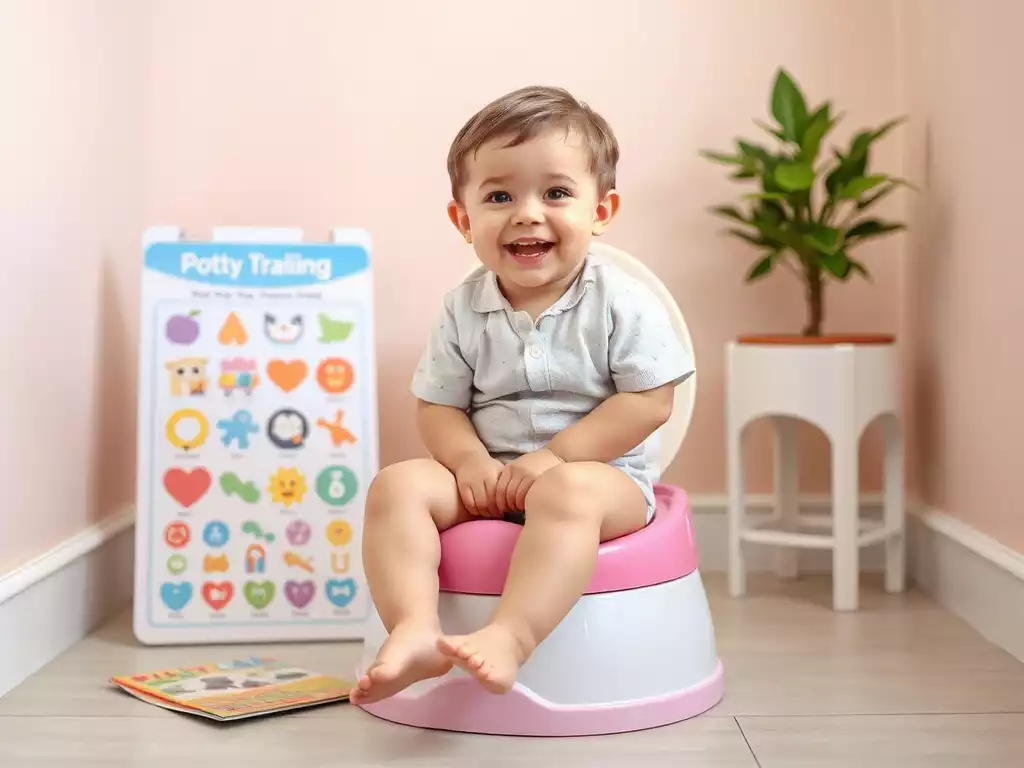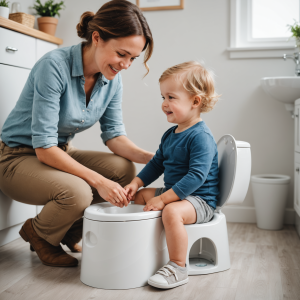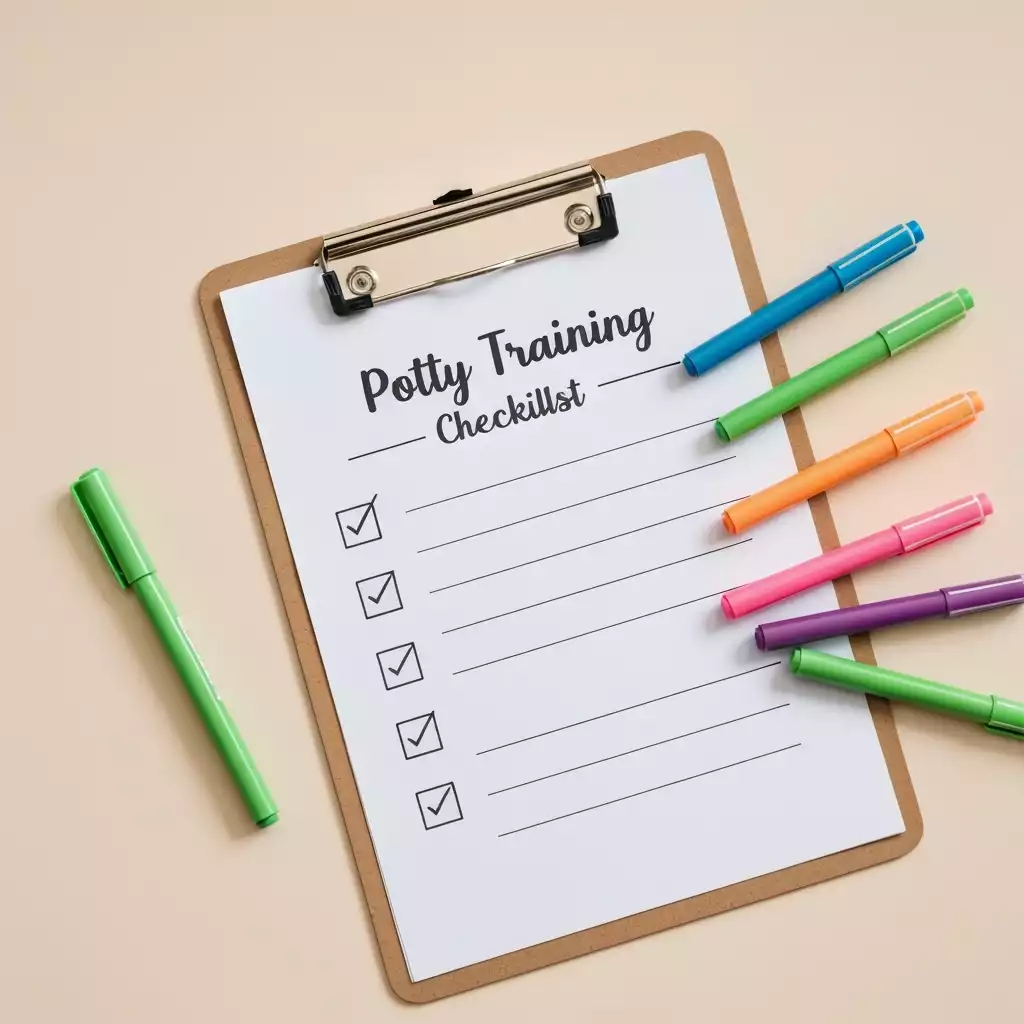What if potty training could unlock your child’s independence and confidence? Understanding the nuances of this journey can make all the difference.
What You Will Learn
- Potty training promotes not just hygiene but also fosters independence and self-esteem in children.
- Recognizing signs of readiness, such as staying dry for longer periods or showing interest in the toilet, can make the process smoother.
- Age is less important than readiness; most children begin potty training between 18 months and 3 years, depending on individual growth.
- Creating a potty training readiness checklist can help parents prepare and navigate this important milestone with ease.
- Establishing a consistent bathroom routine post-potty training helps reinforce skills and maintain success.
- Understanding cultural differences in potty training can provide insights into various practices and methods that may resonate with your family.
- Collaboration with professionals and support systems is vital for addressing the unique challenges faced by parents of special needs children during potty training.
- Utilizing multimedia resources, such as videos and checklists, can enhance the potty training experience for both parents and children.
- Connecting with local potty training services can provide personalized support and community resources tailored to your family’s needs.
Potty Training Readiness: Key Indicators & Milestones
Understanding when your child is ready for potty training involves observing key developmental signs and milestones. The visual below highlights these critical indicators across readiness, age, and a practical checklist. Focusing on individual readiness over strict age guidelines is key to a positive experience for your child, promoting their independence and confidence.
Readiness Signs
- Stays dry for longer periods
- Shows interest in bathroom habits
- Communicates need to go
- Discomfort with dirty diapers
Typical Potty Training Age
Most children start between 18 months and 3 years old. Focus on individual readiness over strict age guidelines.
- Physical development (pants up/down)
- Cognitive skills (understands instructions)
- Emotional readiness (willingness to try)
Readiness Checklist
- Can express need to go
- Has regular bowel movements
- Shows interest in using toilet
- Can follow simple directions
- Stays dry for 2+ hours during day
Long-Term Strategies
- Consistent bathroom routine
- Regular breaks, especially outings
- Positive reinforcement
- Patience during accidents
Understanding Potty Training: Key Concepts for Parents
Potty training is an essential milestone in your child’s development. It’s more than just teaching them how to use the toilet; it’s about fostering independence and boosting their confidence. Understanding the key concepts behind potty training can help parents navigate this journey effectively.
Every child is unique, and the importance of potty training lies in their readiness and willingness to learn. It’s a significant step towards self-sufficiency, allowing your toddler to communicate their needs better and feel more comfortable in their daily routines.
What Is Potty Training and Why Is It Important?
Potty training refers to the process of teaching your child to use the toilet instead of diapers. This transition is crucial not just for hygiene but also for helping your child feel more grown-up. Many parents ask, “Why is it so important?” Here are a few reasons:
- Promotes independence
- Enhances self-esteem
- Reduces diaper-related expenses
- Encourages social interaction with peers
By understanding the significance of this process, you can approach potty training with the right mindset, making it a positive experience for both you and your child. Remember, it’s not just about getting rid of diapers but paving the way for your child’s future successes! For more insights on personal growth and developmental milestones, you might find The Bigger Your Dream, The Better Version of Yourself You Become helpful.
Identifying Readiness: Signs Your Toddler Is Ready for Potty Training
Knowing when your child is ready to start potty training can make all the difference. Each child develops at their own pace, but there are common signs to look for. Here are some indicators that your toddler might be ready:
- Staying dry for longer periods
- Showing interest in the bathroom habits of others
- Communicating the need to go
- Displaying discomfort with dirty diapers
If you notice these signs in your toddler, it might be time to start the potty training journey. However, it’s essential to approach this process with patience and encouragement to ensure that your child feels supported throughout.
Potty Training Age: When Should You Begin?
While there isn’t a specific age that’s considered the best for potty training, most children start between 18 months and 3 years old. As a parent, you should consider your child’s readiness rather than strictly adhering to age guidelines. Here are some factors to consider:
- Physical development: Can your child pull their pants up and down?
- Cognitive skills: Does your child understand basic instructions?
- Emotional readiness: Is your child willing to try?
By focusing on these aspects, you can better determine when to begin potty training. Remember, it’s perfectly normal for some children to take a little longer than others—what matters most is that they feel confident and ready!
Understanding Potty Training Readiness: A Checklist for Parents
Creating a potty training readiness checklist can help you prepare for this exciting milestone. Here’s a simple list to guide you:
- Your child can express when they need to go.
- They have regular bowel movements.
- Your child shows interest in using the toilet.
- They can follow simple directions.
- Your toddler can stay dry for at least 2 hours during the day.
Having this checklist can ease any anxiety you may feel as a parent and provide a clear path forward. Each item on the list contributes to a successful and positive potty training experience!
Quick Summary
Here’s a brief recap of the key points discussed so far:
- Potty training promotes independence and boosts self-esteem.
- Identifying readiness signs in your child is crucial for a successful transition.
- Maintaining open communication and celebrating achievements can enhance the potty training experience.
Embracing the Potty Training Journey
As parents, we all want the best for our little ones, and embracing the potty training journey is a significant milestone. It’s not just about teaching them to use the toilet; it’s about fostering independence and boosting their confidence. While the process may have its ups and downs, developing a long-term strategy can help ensure that success continues well after your child has mastered this essential skill.
One effective approach is to maintain an open dialogue with your child. Encourage them to express their feelings about potty training. This will help them feel supported and understood. Remember, it’s important to celebrate their achievements and reassure them during any setbacks! Just as open communication is vital in potty training, it’s also a cornerstone in other aspects of life, including relationships, where understanding and addressing behaviors like defensiveness can lead to healthier interactions.
Long-Term Strategies for Maintaining Success Post-Potty Training
- Establish a consistent bathroom routine
- Encourage regular bathroom breaks, especially during outings
- Use positive reinforcement to keep motivation high
- Be patient and understanding during accidents
After your child has successfully transitioned out of diapers, it’s crucial to keep the momentum going. Establishing a consistent bathroom routine can help reinforce their new skills. Regular bathroom breaks, especially during outings or before bedtime, can make a world of difference!
Another important aspect is maintaining open communication about their experiences. Encourage your child to share how they feel about using the toilet. This will help them to express any concerns or anxiety they might have along the way.
Cultural Differences in Potty Training: What Parents Should Know
Potty training practices can vary significantly around the world! In some cultures, children are trained at a younger age, while others may take a more relaxed approach. Understanding these cultural differences can help parents choose a method that aligns with their values.
- In some cultures, early potty training (as young as 6 months) is common
- Family involvement is emphasized in certain societies, creating a supportive environment
- Some cultures focus on natural cues and elimination communication
Being aware of these differences allows parents to find a balance that works best for their family. Whether you decide to embrace traditional methods or explore alternative approaches, it’s all about what feels right for you and your child!
Exploring Potty Training for Special Needs Children
Potty training can pose unique challenges for parents of special needs children. However, with the right strategies and support, every child can succeed. It’s important to remember that each child is different, and the approach may need to be adjusted based on their specific needs.
- Evaluate individual readiness and tailor the approach accordingly
- Utilize visual aids and social stories to ease anxiety
- Work closely with therapists or educators for additional guidance
By collaborating with professionals who understand your child’s unique needs, you can create a plan that works for everyone involved. Having the right support system in place will make the potty training journey smoother for both you and your child.
Resources and Support for Parents
In the digital age, resources for potty training are more accessible than ever! From interactive videos to helpful checklists, parents can find a wealth of information to aid in their journey.
Incorporating Multimedia: Videos and Checklists for Enhanced Learning
Visual aids can be a game-changer in potty training! Videos that demonstrate the process can help familiarize your child with what to expect. Additionally, checklists can serve as a fun way to track progress and celebrate small victories.
- Find age-appropriate videos that illustrate the potty training process
- Create a checklist to keep track of daily successes
- Use colorful visuals to make the learning experience enjoyable
Utilizing these multimedia resources can make potty training less daunting for both you and your child. Watching videos together can spark conversations and reduce any anxieties they may have.
Potty Training Books: Recommended Reads for Parents
Books can be a fantastic resource for understanding potty training and finding strategies that resonate with your family. Here are some recommended reads that many parents have found helpful:
- “Potty” by Leslie Patricelli
- “Everyone Poops” by Taro Gomi
- “The Potty Book for Girls/Boys” by Alyssa Satin Capucilli
These books not only provide insights into the potty training process but also present the material in a light-hearted and engaging way for your child. Reading together can also help normalize the conversation around potty training and make it a fun experience!
Comprehensive FAQ: Answering Common Parent Questions About Potty Training
Every parent has questions about potty training, and it’s perfectly normal to seek clarity on certain aspects. A comprehensive FAQ section can address common concerns, providing reassurance and guidance. Here are some frequently asked questions:
- What if my child refuses to use the toilet?
- How can I prevent accidents?
- Is nighttime training different from daytime training?
By having answers to these questions, parents can feel empowered in their potty training journey. Sharing experiences with other parents can also help you find answers to other lingering questions!
Potty Training Forums and Support Groups: Finding Community
Connecting with other parents can be incredibly beneficial. Potty training forums and support groups provide a safe space to share experiences, ask questions, and offer advice.
- Join online forums dedicated to parenting and potty training
- Attend local support groups or workshops
- Utilize social media platforms to connect with fellow parents
Building a community around potty training can make a world of difference. Sharing your experiences and learning from others provides comfort and can ease any fears you might have about the journey! For more on connecting with and learning from others, consider exploring topics like Friendship Day quotes, which highlight the importance of community and shared knowledge.
Encouraging Next Steps for Parents
The potty training journey is just the beginning! As a parent, it’s crucial to take the next steps with confidence and support.
Connecting with Local Potty Training Services
Local potty training services can offer personalized support tailored to your family’s needs. Finding resources in your area can help you tap into expert advice and local community support!
- Research local parenting classes focused on potty training
- Seek recommendations from friends or pediatricians for trusted services
- Explore online directories that list local potty training coaches
By connecting with local services, you’ll gain access to additional resources that can make the potty training experience smoother for you and your child!
Making Potty Training a Positive Experience for Your Child
Remember, potty training should be a fun and positive experience! Celebrate every small success and make it a joyful milestone in your child’s development. Utilizing games, songs, or rewards can help keep the momentum going!
- Incorporate fun songs while using the toilet
- Use sticker charts to track progress and reward successes
- Share stories of other children’s potty training successes
By keeping things light-hearted and encouraging, you’ll help your child feel proud of their accomplishments. This positive approach will not only strengthen your bond but also promote a sense of achievement in your little one!
Frequently Asked Questions About Potty Training
Q1: What are the primary benefits of potty training beyond hygiene?
A1: Potty training significantly promotes independence and boosts self-esteem in children, making them feel more grown-up and comfortable in their daily routines.
Q2: How do I know if my child is ready for potty training?
A2: Key indicators include staying dry for longer periods, showing interest in others’ bathroom habits, communicating the need to go, and expressing discomfort with dirty diapers. Focusing on these readiness signs is more important than strict age guidelines.
Q3: Is there a specific age when I should start potty training my child?
A3: While most children start between 18 months and 3 years old, individual readiness (physical, cognitive, and emotional) is more crucial than age. Patience and encouragement are vital.
Q4: What are some long-term strategies to ensure continued success after potty training?
A4: Establishing a consistent bathroom routine, encouraging regular breaks (especially during outings), using positive reinforcement, and being patient during accidents are key for maintaining success.
Q5: How do cultural differences impact potty training approaches?
A5: Potty training practices vary globally; some cultures begin as early as 6 months, while others emphasize family involvement or natural cues. Understanding these can help parents choose a method that aligns with their values and child’s needs.
Recap of Key Points
Here is a quick recap of the important points discussed in the article:
- Potty training promotes independence, enhances self-esteem, and reduces diaper expenses.
- Signs of readiness include staying dry for longer periods and showing interest in toilet habits.
- Focus on physical, cognitive, and emotional readiness rather than just age when starting potty training.
- Establish a consistent bathroom routine and use positive reinforcement for success post-potty training.
- Cultural practices vary; understanding these can help find a suitable approach for your family.
- For special needs children, tailor the potty training approach to individual readiness and needs.
- Utilize multimedia resources like videos and checklists to enhance the potty training experience.
- Engage with community support through forums and local services to share experiences and seek advice. For further community engagement tips, consider how to start up a business, which also highlights the importance of community and shared knowledge.
- Keep the potty training process positive by celebrating small successes and incorporating fun elements.



